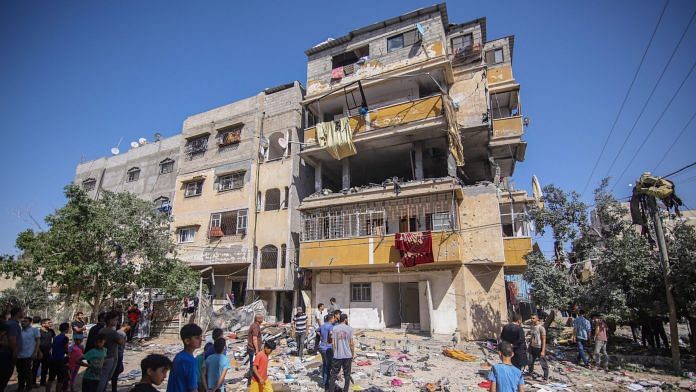Since war broke out in Israel last week, President Joe Biden has walked a fine line. His administration has touted its high-level diplomacy in hopes of reaching a cease-fire, while also defending Israel’s right to defend itself.
On Wednesday, the president mildly increased the pressure on the Israelis, saying he expected to see de-escalation in the next 24 hours. Israeli Prime Minister Benjamin Netanyahu responded that he has no intention of stopping the operations against Hamas for now.
A cease-fire of sorts is of course inevitable. It’s how the last three wars between Hamas and Israel have ended. But the end of the fighting will just be a prelude to the next war, as Hamas replenishes its rockets and missiles in preparation for its never-ending quest to destroy the Jewish state.
Israel is in no position to drive Hamas from Gaza. It has the military power to do so, but there is no political will to reoccupy the strip of land that Israel vacated unilaterally in 2005. So Israel fights for a longer period of quiet, all the while bracing for the war to come.
These limits on Israeli strategy, however, need not constrain U.S. diplomacy. Biden needs to think creatively about how to rid Gaza of Hamas. This is not just a priority for Israel — it is a necessary condition for Palestinians to achieve prosperity and dignity.
Today the Palestinians of Gaza are hostages to Hamas. Biden should devise a political strategy aimed at freeing them.
A first step should be in the negotiations for the cease-fire. Biden should avoid the mistake of former Secretary of State John Kerry, who in 2014 tried to negotiate a cease-fire with friendlier patrons of Hamas, such as Qatar and Turkey. Biden should deal primarily with Egypt, whose leader has no love for Islamists such as Hamas and is trusted by the Israelis.
Biden should also demand that any reconstruction aid for Gaza bypass Hamas entirely. This could be done by empowering elements of the Palestinian Authority in the West Bank, for example, or by working with Arab allies that have already reached diplomatic agreements with Israel, such as the United Arab Emirates. Gazans need aid desperately — but none of that aid should go to the coffers of Hamas.
Biden should also reconsider his decision to renew U.S. funding for the U.N. Relief and Works Agency. Since 2007, when Hamas took over Gaza, the agency has acted as an unofficial arm of the local government in Gaza. At the very least, U.S. aid should be conditioned on purging Hamas members from its payroll.
In the medium term, Biden should seek to revive Palestinian civil society and electoral politics. There have been no Palestinian elections since 2006. Last month, the octogenarian leader of the Palestinian Authority, Mahmoud Abbas, canceled scheduled elections to hardly any protest from the U.S. and Europe. Abbas probably has only a few years left. Biden should begin planning now for elections once he leaves office.
The only lasting way to vanquish Hamas is for Palestinians to do the vanquishing. This will be a difficult task. But it’s not inconceivable that Hamas can lose. In March, before the current fighting began, a poll from the Palestinian Center for Policy and Survey Research found that only 30% said they would vote for Hamas in the next elections.
Ghaith al Omari, a senior fellow at the Washington Institute for Near East Policy, said he supports open elections within Fatah, the secular party in charge of the Palestinian Authority, to give an opportunity for younger, more creative leaders to emerge. Abbas has largely purged dissenters from his regime. Free and fair elections within Fatah could reinvigorate a calcified and corrupt movement.
For too long, the U.S. has neglected Palestinian democracy. The last president to make it a priority, George W. Bush, was seen as a failure because he allowed Hamas to take part in legislative elections in 2006 without demanding that they first disarm. That was a mistake. But Bush was correct that no peace with Israel is possible until the Palestinian people can hold their leaders accountable. And no dignity for Gaza is imaginable so long as Hamas is in charge. — Bloomberg
Also read: What is Hamas, how it rose to power & its role in Israel-Palestine conflict



